Check Order Status
For immediate assistance, please call 1-866-452-7707
Polycarbonate Glass™
Choose Your Shape

Rectangle

Square
Select Dimensions
Match Diagram to Dimensions
Delivery: Ships within 5 business days
Polycarbonate Glass
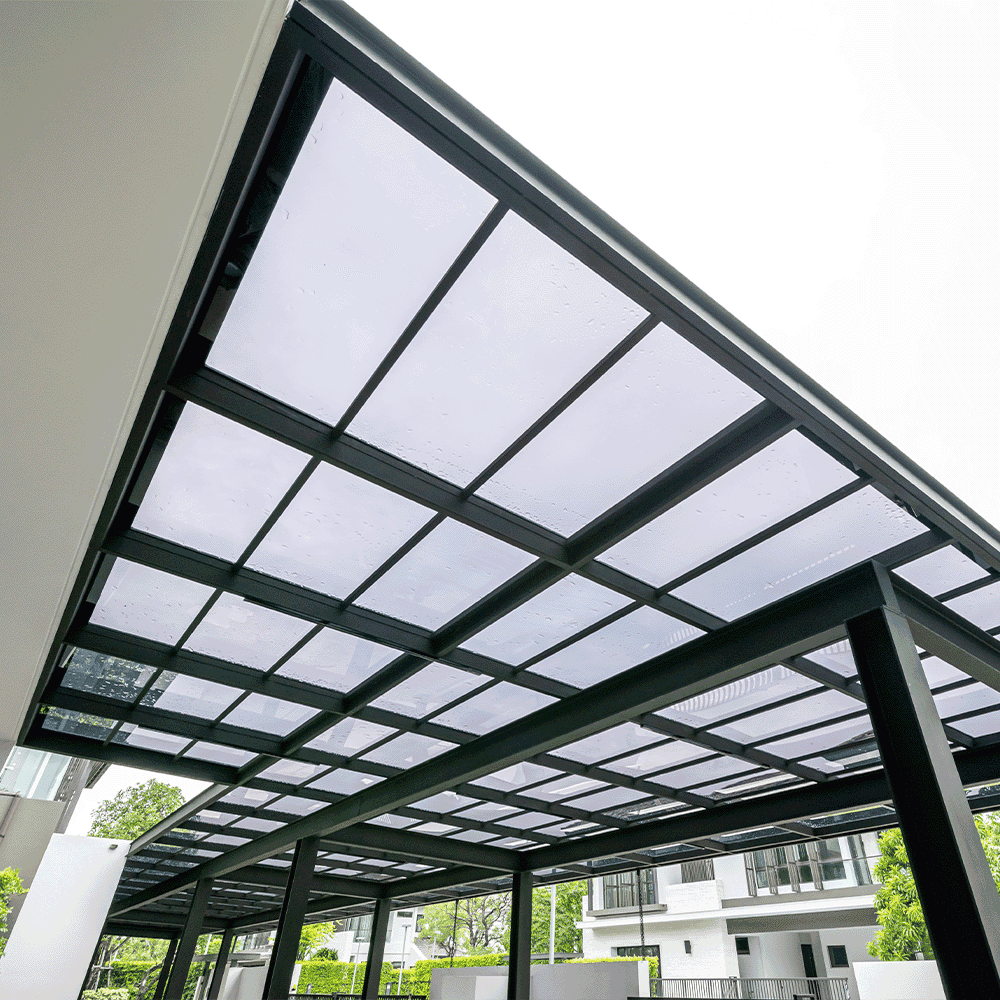

What is Polycarbonate?
Explore the adaptability of polycarbonate, a thermoplastic polymer recognized for its robustness and lightweight properties. With a resilience of 200 times greater than traditional glass, polycarbonate has become a go-to material for safety glazing in highly demanding spaces such as schools and hospitals. Beyond its safety application, its adaptability shines in architecture, gracing building facades, skylights, and canopies with design flexibility and versatility.
Customizable Options for Polycarbonate Glass
At Dulles Glass, we provide tailored solutions to meet your polycarbonate sheet requirements, with options available for customization. Select from thickness choices of 1/8 and 1/4 inch, featuring a cutting tolerance within 1/8. The 1/8 inch option is well-suited for lightweight applications like picture frames or cabinet glass, while the 1/4-inch thickness combines lightness and durability, making it ideal for windows and panels, providing cost-effective protection. Available in both rectangular and square shapes with straight corners, it is perfect for DIY projects requiring design flexibility. Choose your preferred size, confirm your order, and we will perfectly cut your customized selection

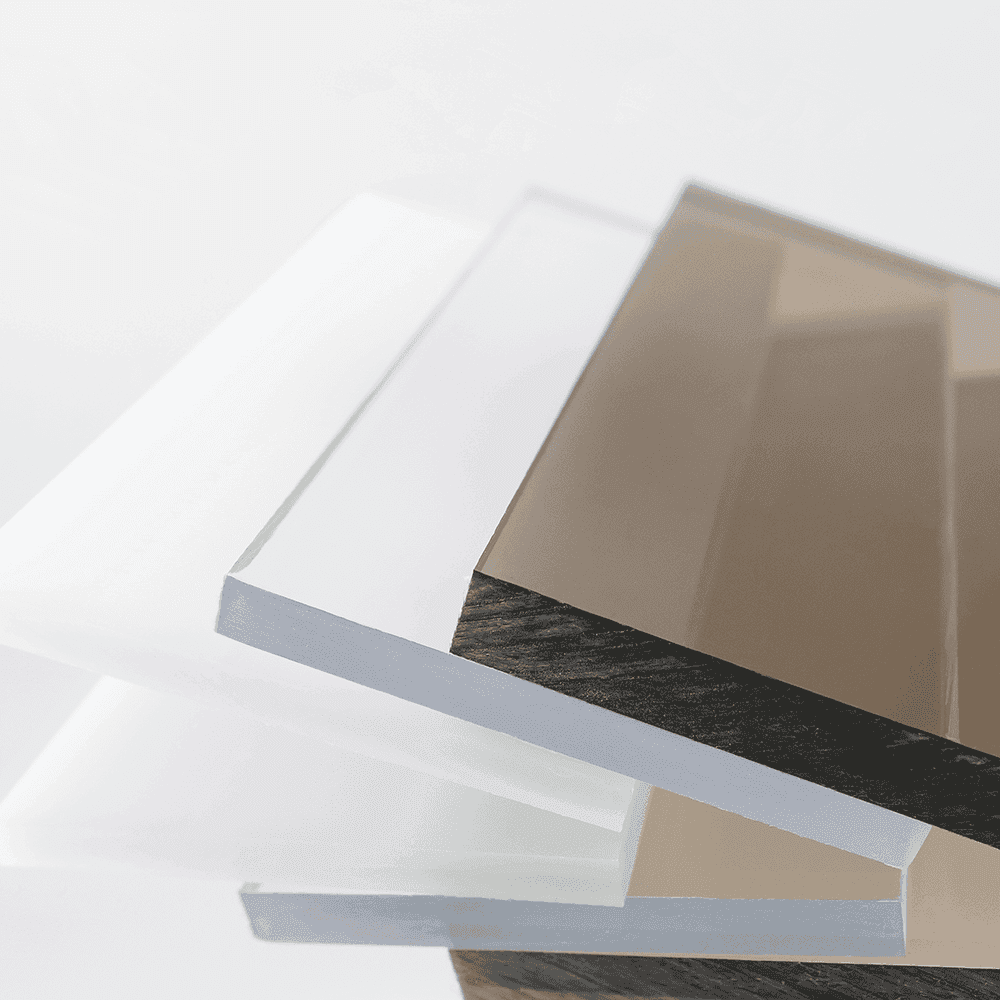
What is polycarbonate glass?
Polycarbonate glass, also known as “PC resin” — a thermoplastic polymer that stands out as a versatile material widely used for its exceptional qualities. With a tensile strength 200 times more robust than traditional plastic, it has become a preferred alternative to conventional glass, offering a surface that is harder to break.
Despite its high impact resistance, polycarbonate may have slightly lower scratch resistance than standard glass. It also tends to develop a yellow tint over time with exposure to UV rays unless a specific UV-grade variant is used.
Commonly utilized as safety glazing, its flexibility enables shaping without additional heat through a process known as cold bending, making it both versatile and adaptable for a variety of applications. In its solid form, it can be shaped, easily cut, and drilled, highlighting its adaptability across different industries and settings.

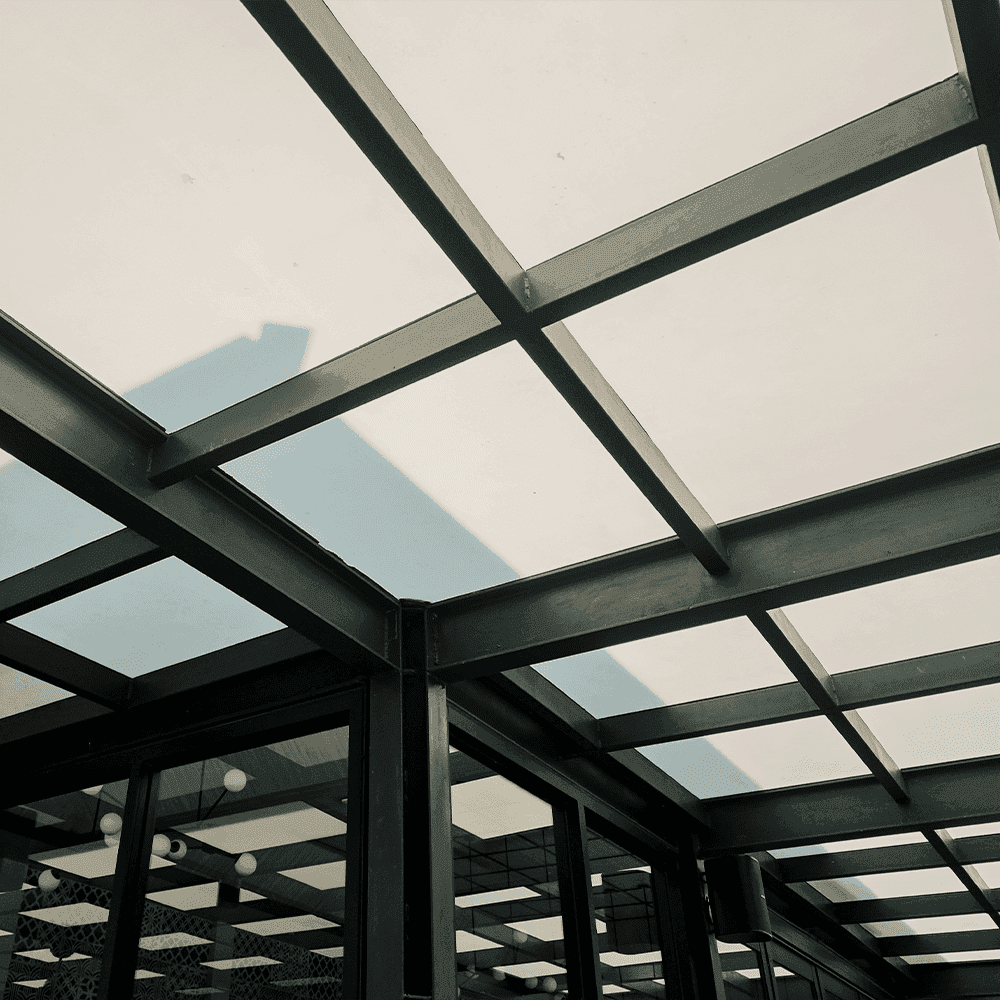
What is polycarbonate glass used for?
Polycarbonate glass has become essential for various applications due to its virtually unbreakable and vandal-proof qualities. Widely chosen for safety glazing in critical environments like schools, hospitals, public centers, and subways, polycarbonate excels in ensuring strength and resistance to impact. Its adaptability has garnered favor in architecture, offering solutions for natural lighting in facades, interiors, and roofs, with design flexibility allowing for visually striking elements. Its easy-to-modify nature makes it a favored choice for DIY projects such as window and door replacement.
Polycarbonate extends beyond safety applications to everyday household items, automotive use, and architectural elements in commercial settings. Its versatility includes applications such as bullet-resistant windows, technology cases, machinery guards, and UV-grade variants, making it a crucial choice across diverse fields for its resilience and adaptability.

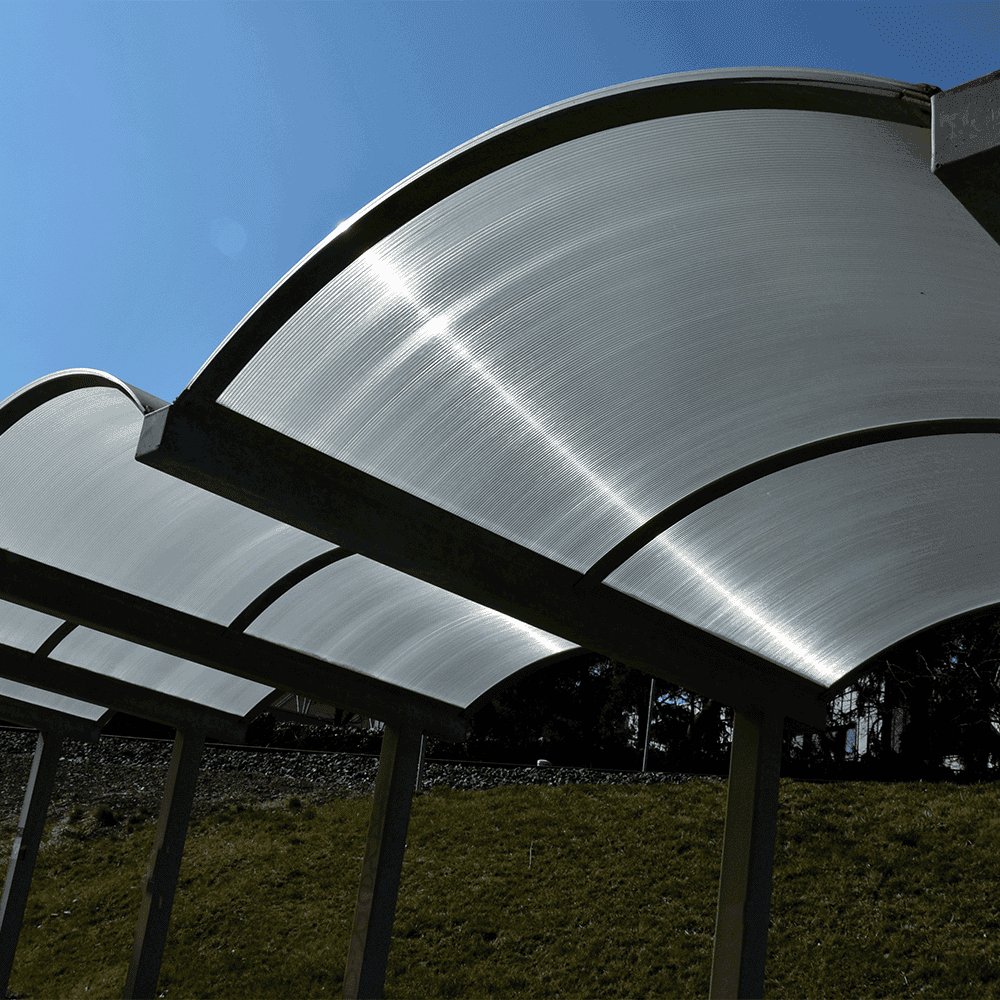
Is polycarbonate glass unbreakable?
Polycarbonate glass is known for its nearly unbreakable nature, providing a distinct advantage over traditional glass, particularly in terms of safety. With the ability to withstand extreme force during harsh weather conditions, it stands out as a durable and resilient material. Impressively, it is 30 times stronger than Plexiglass and over 200 times stronger than conventional glass.
Its exceptional strength allows it to endure substantial force, making it nearly impervious to breakage. In fact, bullet-resistant varieties of polycarbonate are used in applications such as police shields, safety helmets, and protective screens. Its lightweight nature offers superior strength and facilitates easy transportation and installation in various settings.

Which is better tempered glass or polycarbonate?
When comparing tempered glass and Polycarbonate, especially for areas susceptible to vandalism or impact from flying objects, polycarbonate emerges as the superior choice due to its greater strength and durability. Unlike tempered glass which is more susceptible to breakage and damage, polycarbonate panels are a practical and efficient solution that saves time and money and minimizes the risk of potential injuries in these areas and projects. With nearly unbreakable properties, 200 times greater resistance to impact, and the ability to withstand extreme weather conditions, polycarbonate proves itself as a reliable and robust option.
Tempered glass sheets shatter into small pebble-like pieces when cut or drilled, while polycarbonate provides flexibility. It can be cut easily or drilled without breaking into small fragments. Affordability is an additional advantage, as polycarbonate is more cost-effective than tempered glass. Visit our tempered glass blog to learn more about this other glass type.

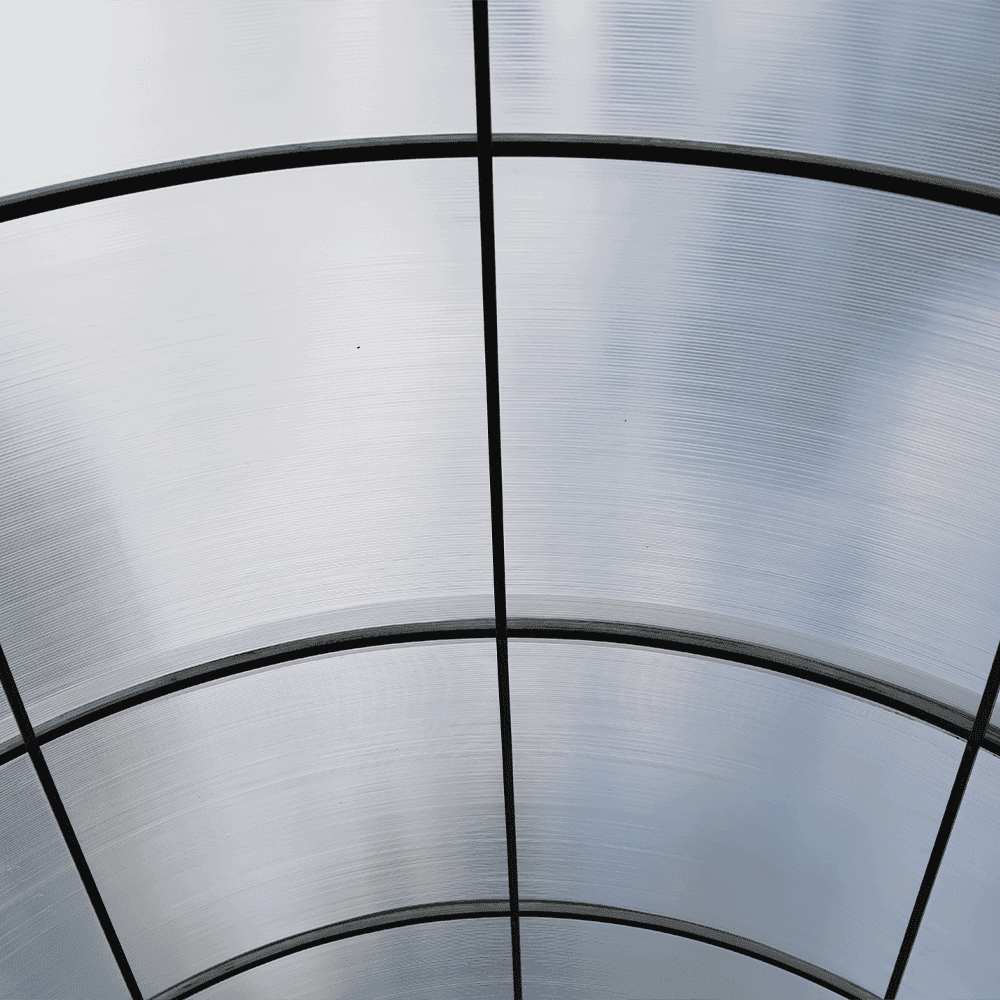
What are the advantages of polycarbonate?
Polycarbonate glass, also known as “PC Resin”, is a versatile and preferred choice for various applications due to its excellent qualities. Its transparency allows ample light transmission, making it ideal for safety barriers, windows, and see-through shields. Its outstanding resistance to impact renders it virtually unbreakable, making it essential for safety gear such as bulletproof glass, safety goggles, and car headlights. With the ability to withstand high temperatures without warping or melting, it became a prominent material for cookware and LED light covers. Despite its strength, PC resin remains lightweight, making it popular in the aerospace and automotive industries to reduce weight. It can also endure UV rays, making it valuable for applications like greenhouse panels and outdoor equipment covers. These properties make it a versatile and indispensable material in various industries.

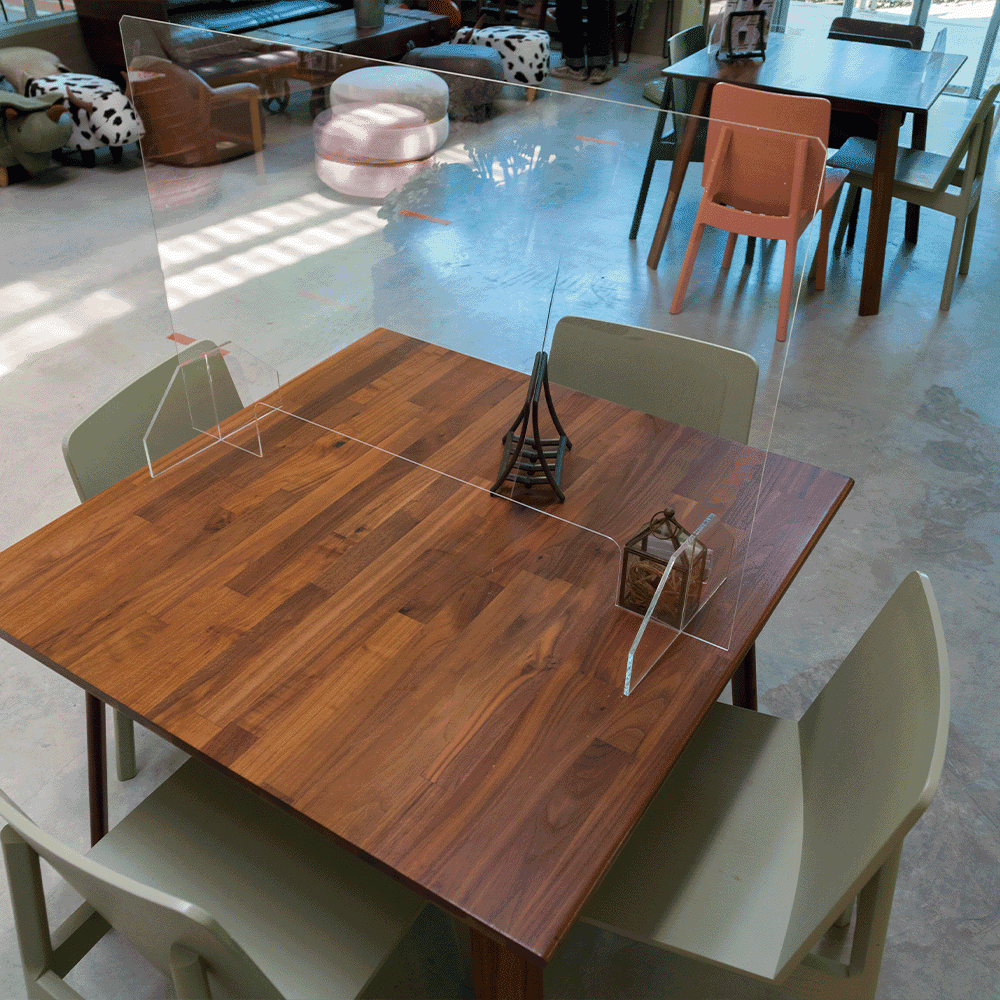
What are the disadvantages of polycarbonate?
Polycarbonate's transparency allows ample light transmission, making it ideal for safety barriers, windows, and see-through shields. Its outstanding resistance to impact renders it virtually unbreakable, making it essential for safety gear such as bulletproof glass, safety goggles, and car headlights. With the ability to withstand high temperatures without warping or melting, it became a prominent material for cookware and LED light covers. Despite its strength, PC resin remains lightweight, making it popular in the aerospace and automotive industries to reduce weight. It also provides UV protection, making it valuable for applications like greenhouse panels and outdoor equipment covers. These properties make it a versatile and indispensable material in various industries.

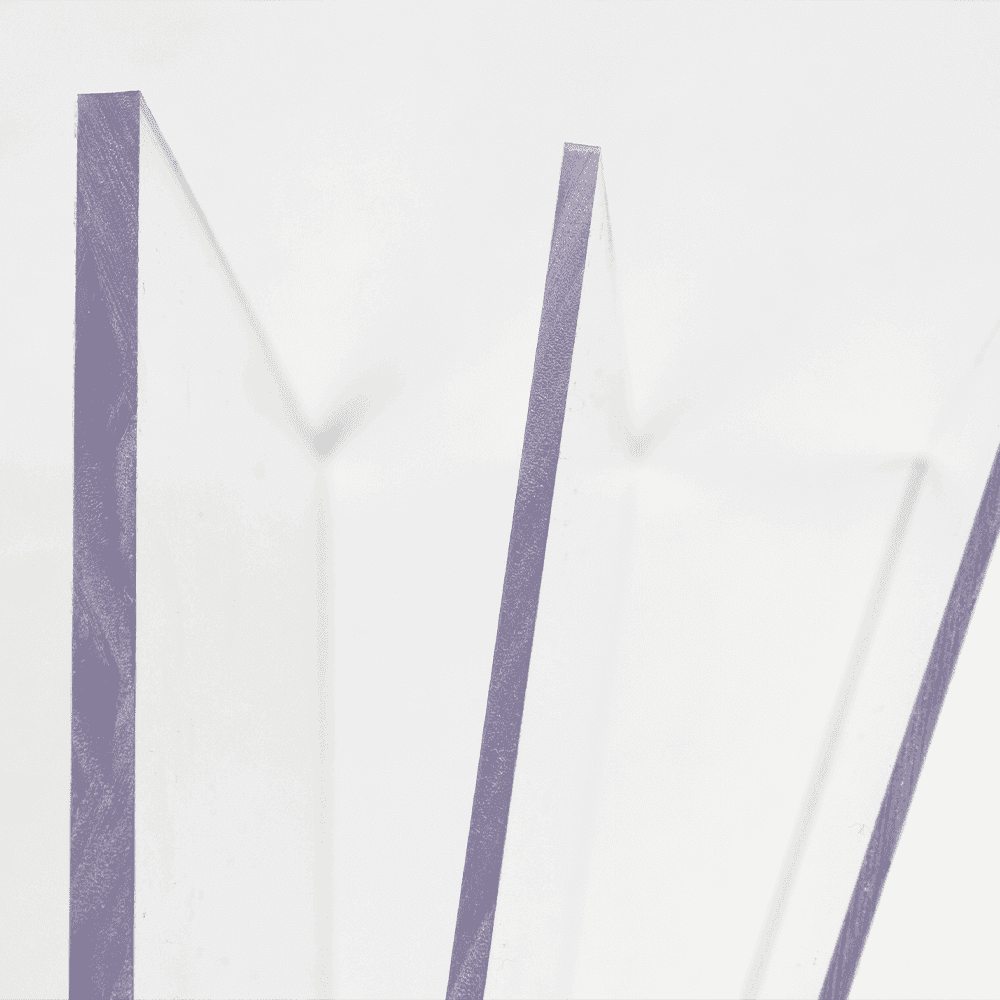
Is polycarbonate stronger than steel?
Polycarbonate panels exhibit remarkable strength, surpassing steel in certain aspects. It stands out as a resilient material with the ability to endure blasts exceeding 900 psi. It is approximately 200 times stronger than steel when considering weight. This unique characteristic allows polycarbonate to absorb impact energy flexibly and swiftly return to its original shape. It has a higher tensile strength and thermoplastic nature while steel tends to dent upon impact. Despite these key features, polycarbonate is not universally superior to steel. It falters when rigidly held, as seen in situations involving bolting. Deciding between polycarbonate and steel ultimately depends on the specific needs required for a particular application.

Polycarbonate vs Plexiglass
| Polycarbonate | Plexiglass | |
|---|---|---|
| Cutting and Shaping | Doesn't break when drilled and can be bent without heating (cold bending). | Can be polished effectively using either mechanical or flame polishing. |
| Optical Clarity | Less transparent than plexiglass and resembles glass in its see-through quality. | Excellent transparency and clarity |
| Impact Resistance | 250 times more impact-resistant than glass | 10 times more impact-resistant than glass |
| Weight | Lighter than regular glass and Plexiglass | Lighter than regular glass |
| Cost | More expensive than acrylic/plexiglass | Less expensive than polycarbonate |
| Scratch Resistance | Easier to scratch, and minor scratches cannot be polished away | More resistant to scratches |
| Applications | Ideal for high-impact applications like safety shields, machinery guards, and bulletproof windows | Widely used for signage, DIY picture frames, sneeze guards, and other low-impact applications |
| UV Resistance | Naturally UV-resistant | May degrade over time in prolonged sunlight |
| Temperature Resistance | More heat-resistant, suitable for outdoor use | Sensitive to high temperatures and may warp |
| Durability | Less rigid than acrylic/plexiglass | more rigid and cracks easier than polycarbonate |
| Chemical Resistance | Highly resistant to different kinds of acids, oxidizing agents, oils, wax, and chemicals. | It withstands exposure to inorganic chemicals, fats, oils, diluted acids, and concentrated alkalis at room temperature. |

Help & Installation Videos
Not sure where to start? We’ve put together a series of helpful videos for you.

More Helpful Tips
From how to clean table tops to unique DIY projects for tables with glass tops. We have a collection of helpful tips for you!

Need Expert Help?
Buy in Bulk
Become a Dulles Glass PRO

Polycarbonate Glass FAQs
Known as a robust plastic variant, polycarbonate comes in flexible grades, showcasing its resilience. Its high strength sets it apart, providing resistance against impacts and fractures. Moreover, its lightweight nature makes it a great substitute for traditional glass. The diverse range of flexibility options makes polycarbonate a valuable material with applications spanning from rigid structures to more pliable uses, showcasing its versatility.
Polycarbonate is a cost-effective alternative to traditional glass, offering a more budget-friendly option without compromising durability. Polycarbonate stands out as a more affordable choice than glass and other plastic materials while maintaining a lightweight and flexible nature. Its resilience makes it less prone to breakage or damage, contributing to long-term cost savings by reducing the need for glass replacements. While polycarbonate is pricier than normal glass, its overall advantages, including ease of handling and reduced risk of breakage, make it an economically sensible choice for various applications.
Cleaning agents like thinners, benzene, or acetone, commonly used for cleaning, should be avoided as they can soften polycarbonate and leave a permanent haze. Though convenient, pressure washers can cause damage and should not be used to clean polycarbonate structures. To preserve the integrity and clarity of polycarbonate surfaces, it's crucial to use recommended cleaning methods and steer clear of substances like gasoline, ethylene chloride, chloroform, tetrachloroethane, m-cresol, and pyridine, which can result in partial dissolution, swelling, and potential color change or whitening.
The choice of polycarbonate sheet depends on the intended application, and solid polycarbonate sheets are favored for situations demanding strength. Solid structures offer higher impact resistance compared to other plastic or glass sheets or hollow polycarbonate counterparts. This makes them ideal for construction, protective barriers, and glazed panels for industrial and commercial projects where robustness is essential. Ultimately, the selection should align with the specific demands of the intended application.
When selecting the thickness of polycarbonate for roofing, a secure baseline for structures like pergolas, garages, and greenhouses typically ranges from 4 to 8 mm. For superior heat and sound insulation, thicker options such as 25mm, 32mm, and 35mm are commonly utilized in external roofing applications. The thicker sheets enhance structural integrity and contribute to better climate control and noise reduction, making them ideal for varied roofing needs.
Plexiglass stands out as a more budget-friendly alternative to PC resin, also known as polycarbonate, offering a cost-effective solution for applications where impact resistance is not a top priority. Its affordability makes it a practical choice for projects with tight budgets, without compromising on quality. Additionally, it boasts superior transparency compared to polycarbonate, making it a preferred option in situations where optical clarity is paramount.
The turnaround time for shipping at Dulles Glass varies depending on the items purchased and the specific delivery methods available. For in-stock products, the delivery typically takes place within 1 business day. However, custom products are shipped within 1-3 business days.
Certainly! Our team at Dulles Glass is dedicated to assisting in the customization process. Whether you have technical or glass design-related questions, feel free to reach out to us through live chat, email (info@dullesglass.com), or by calling us at (866) 452-7707. Whether it's for a new glass installation or a replacement glass, we are here to guarantee a seamless and customized experience for your glass needs.

Customization At Its Best
Whether your project is just getting started or needs help to find the final touch, our glass and design experts are here to help you make your dreams come true.

Fast & Free Shipping
Nationwide free shipping on your entire order, delivered within 3 - 7 days. Guaranteed to arrive in one piece!

Expert Customer Service
Our friendly team is here for you 7 days a week. Call, email, text or live chat with us.

Best Deals & Rewards
Prices that fit your budget and amazing deals and rewards to maximize your savings.
Our customers say
Excellent
4.9 out of 5 stars
Dulles Glass
Company
Support

Learn more about our:
Price Match Guarantee
United States © 2025 Dulles Glass. All Rights Reserved.






